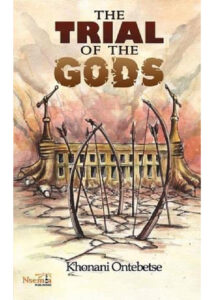
- Title: Book Review: Cast the First Stone
- Year: 2022
- Author: Isaiah Achola
- Publisher: Nsemia Inc.
- Reviewed on: March 7, 2024
The Flipside of Modern Bureaucracy
A Review of Isaiah Achola’s Cast the First Stone (Nsemia Inc. 2022)
Published in 2022, Isaiah Achola’s Cast the First Stone is a heart-rending tale of the demerits of modern bureaucracy with close reference to the media in an imaginary African state. The subject of the novel takes the bearing of postmodernist scholars such as Heidegger (1954) and Matlack (2014) who associate the rationalization of bureaucracy with mechanization that turns subordinate workers into automatons. Heidegger contends that modern bureaucracy tends to dehumanize workers such they are arranged like commodities in a storeroom. Matlack contends that modern managers operate like machines as they handle workers in a regimented system, which denies them freedom as humans. These tenets permeate through the plot, subject, characterization and style of the novel.
Achola’s Cast the First Stone is a picturesque novel about the pivotal role of the press in the fight for positive change in corruption-ridden societies. The story is told through Kalamu, a brave and selfless investigative journalist, who defies intimidation by a corrupt modern bureaucracy at Mzalendo Broadcasting Authority to unearth scandals in the city.
One such scandal begins when Kamari rallies the poor city dwellers to be allocated land by the government. The land is allotted but government officials solicit kickbacks. After the hawkers pay, high-ranking officials grab the land; thereafter, Kamari is found dead.
After his funeral, an odd conclusion that Kamari committed suicide is reached. The hostile attitude of the crowd at the event prompts Kalamu to investigate the matter and it is profoundly shocking to discover that senior civil servants have cheated the poor out of their land.
Among the beneficiaries of the stolen property are Kalamu’s bosses, Wanyoola and Mkonyi, the Managing Director and the Managing Editor, respectively. Further, Kalamu is astonished to learn that a clique of government officials plotted Kamari’s murder as punishment for making a relentless follow-up.
As soon as the investigative report is aired on Mzalendo Television, Kalamu’s Managing Director connives his arrest as other beneficiaries of graft apprehend and kill Mr Firimbi, Kalamu’s major source at the Ministry of Lands. Thereafter, when a Parisian Institution admits Kalamu to further his studies in investigative journalism, his boss Wanyoola revokes the scholarship and hands it to Purity, his crony.
In the meantime, the police release Kalamu. Still, as he prepares to investigate other emerging scandals in government, Mkonyi transfers him from the Special Projects Desk to the less consequential International News Desk. There is no doubt that senior officers in the media and government abuse their bureaucratic authority to frustrate the ends of justice and propriety.
Cast the First Stone is an indictment of modern bureaucracy in the perpetuation of corruption, through the creation of highhanded characters in positions of responsibility in government and the Fourth Estate. Power in Kalamu’s organization, Mzalendo Broadcasting Authority, flows from the influential bureaucrats to the managers, reporters and ordinary journalists within. Mkonyi, the Managing Editor takes orders from the Managing Director and expects his subordinates to submit to his directives to serve the interests of influential civil servants and their godfathers regardless of the harm they pose to others and professionalism.
When Mkonyi invites Kalamu to remind him of the Authority’s policy, he underscores how Kalamu’s story offends “senior people in government.” He expounds that Kalamu’s focus on the offended mourners should not have pervaded the report. In Mkonyi’s view, the newsroom should represent the interests and views of senior bureaucrats. He counters, “The management does not think so” about the meaning of news. “They’ve questioned the wisdom of highlighting a local and isolated problem on national TV.” This suggests that the professional content and ethics handed down from Kalamu’s trainers are irrelevant to the Mzalendo Broadcasting bureaucracy. Going by Matclack and Heidegger’s postulation, Kalamu is a conveyor that has to move to the bearing of the motor’s wishes. The motor constitutes the senior civil servants in government who conspire to set the agenda of the media.
Achola reinforces the subject through a clever combination of dialogue and vivid description to show how bosses subjugate junior workers to perpetuate acts of corruption. Using omniscient narration, Achola describes how Mkonyi vows never to recommend Kalamu for promotion as long he maintains his “know-it-it-all attitude.” This aspect of bureaucracy that demands the boss’ recommendations for subordinates to be promoted reiterates Heidegger’s notion of the mechanization of humanity. Further, Achola describes how corrupt ministers with vested interests, compel Mkonyi to lead a campaign to justify the use of speed governors and within weeks, all operators in the public transport sector are forced to purchase the devices from the ministers’ companies. Having made millions, the two ministers release their bribes in brown envelopes; Mkonyi receives KES 150,000 and property into the bargain. Cast the First Stone is hence a timely novel that challenges the reader to reflect on the demerits of bureaucracy.
Andrew Nyongesa, PhD
Lecturer of Literary Studies
Murang’a University of Technology
February, 2024








